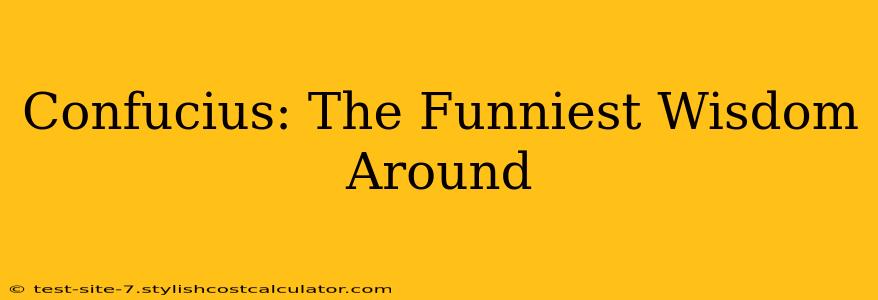Confucius, the ancient Chinese philosopher, is often depicted as a serious and austere figure. However, a closer look at his teachings reveals a surprising amount of humor, often subtly woven into his profound observations about life, society, and human nature. While not stand-up comedy, his sayings, when understood in context, offer a witty and insightful perspective on the human condition, making them surprisingly funny, even centuries later. This isn't just about chuckling at ancient proverbs; it's about appreciating the wisdom embedded within the humor. This article will explore the surprisingly funny side of Confucius, examining his wit and how his seemingly simple sayings hold layers of comedic depth.
What is so funny about Confucius' teachings?
The humor in Confucius' teachings stems from several sources. First, his observations are often sharply ironic. He points out the hypocrisy and absurdity of human behavior with a detached amusement, highlighting the gap between what people aspire to and what they actually do. Second, his use of paradox and understatement creates a subtle comedic effect. He often presents seemingly contradictory statements, forcing the listener to consider multiple perspectives and ultimately find the truth in the balance. Third, his anecdotes and stories, though few in number in surviving texts, often have a comedic undercurrent, using gentle satire to illustrate his points. Finally, his wisdom, when applied to modern situations, often reveals unexpected and humorous parallels.
Why is studying Confucius relevant today?
Confucius’ teachings remain remarkably relevant today because they address timeless human struggles. His emphasis on self-cultivation, ethical conduct, and social harmony continues to resonate with people seeking meaning and purpose in their lives. The humor in his sayings isn't just a pleasant distraction; it serves to make his wisdom more accessible and memorable. His insights on leadership, interpersonal relationships, and the pursuit of a virtuous life offer valuable lessons that can be applied to navigating the complexities of modern society. By understanding the comedic elements in his teachings, we can engage with his philosophy on a deeper and more enriching level.
What are some of the funniest quotes from Confucius?
Many of Confucius' sayings, when considered in the context of modern life, offer a surprisingly comedic perspective. For example, his quote, "It does not matter how slowly you go as long as you do not stop," while appearing motivational at first glance, can also be considered a funny acknowledgment of human procrastination and the often-slow pace of progress. The humorous element lies in the recognition that many of us need this gentle encouragement to keep going, even at a snail's pace.
Is Confucius' humor intentional?
Determining the intent behind the humor in Confucius' teachings is difficult. The texts themselves often lack explicit comedic intent; however, the sharp wit and subtle irony present suggest an awareness of the comedic potential of his observations. The lasting impact of his sayings, their ability to resonate with audiences across millennia and cultures, points to a timeless quality that transcends mere philosophical instruction. It suggests a profound understanding of the human condition, one that encompasses both the serious and the absurd.
How can we appreciate the humor in Confucius' teachings?
To truly appreciate the humor, one must approach Confucius' teachings with a sense of open-mindedness and a willingness to consider the multiple layers of meaning embedded within his sayings. Consider the context of his time and the social norms he was addressing. Try to identify the irony, the subtle paradoxes, and the understated wit. And most importantly, apply his teachings to your own life and observe the humorous parallels that inevitably emerge. It’s in this engagement, this active interaction with his philosophy, that the comedic genius of Confucius truly shines through.
Are there any books or resources for further exploration?
There are many excellent books and resources available to further explore the teachings of Confucius. Searching for "Confucianism" or "Analects of Confucius" will yield a wealth of information, including translated texts, scholarly analyses, and accessible introductions to his philosophy. Engaging with these resources will provide a deeper understanding of the context and nuances of his teachings, enriching your appreciation of his surprisingly funny wisdom.
This exploration into the funny side of Confucius reveals a philosopher who was not only deeply insightful but also possessed a keen sense of humor, subtly woven into his profound observations about life. By understanding and appreciating this comedic element, we can engage more deeply with his teachings and gain a fresh perspective on his enduring wisdom.

